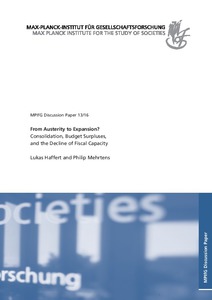From austerity to expansion? Consolidation, budget surpluses, and the decline of fiscal capacity
"In the wake of the financial crisis, most developed countries have entered a period of prolonged budgetary austerity. While the success of austerity programs is still unclear, it is also an open question what success would mean for activist government in the long run. This paper rejects the pr...
| Main Authors: | , |
|---|---|
| Institution: | ETUI-European Trade Union Institute |
| Format: | TEXT |
| Language: | English |
| Published: |
Köln
2013
MPIfG |
| Subjects: | |
| Online Access: | https://www.labourline.org/KENTIKA-19121209124919494819-From-austerity-to-expansion?-C.htm |
| Summary: | "In the wake of the financial crisis, most developed countries have entered a period of prolonged budgetary austerity. While the success of austerity programs is still unclear, it is also an open question what success would mean for activist government in the long run. This paper rejects the progressive belief that successful fiscal consolidation will lead to a strengthening of fiscal capacity, arguing that consolidations transform the political context in which fiscal policy is made. By analyzing the evolution of public expenditure in six countries with sustained budget surpluses, it shows that while surpluses were mostly achieved through expenditure cuts, they were predominantly used for cutting taxes. While fiscal crises abated, their collateral damage to public expenditure remained. This result is further elaborated by a case study of the Swedish budget surplus. The paper concludes that consolidations can create a specific type of fiscal regime and thus have long-term consequences for the fiscal capacity of the state." |
|---|---|
| Physical Description: | 32 p. Digital |

